Laurel is using AI to solve a trillion-dollar industry pain point: making the time of knowledge workers visible, measurable, and optimizable.
Written by: Leo, Deep Thought Circle
Have you ever wondered why the manufacturing industry can precisely calculate the cost of producing a car down to the minute, and the retail industry can accurately track the inventory of each item, while law firms, accounting firms, and consulting companies are completely unaware of their most important resource—human time? This question has troubled me for a long time until I learned that Laurel has just completed a $100 million Series C funding round. This company is using AI to address a trillion-dollar industry pain point: making the time of knowledge workers visible, measurable, and optimizable.
Upon further investigation, I found that Laurel is not just doing simple time tracking. They are building the world's first AI time platform, attempting to solve what founder Ryan Alshak calls the "time intelligence challenge"—the inability of knowledge-based industries to accurately link time investment to business outcomes. In the age of AI, quantifying and understanding human capital has shifted from being a "nice-to-have" to a "matter of life and death" business necessity. This funding round was led by IVP, with participation from GV (Google Ventures) and 01A, and new investors include notable figures such as DST Global, Kevin Weil from OpenAI, Alexis Ohanian, and GitHub CTO Vladimir Fedorov.
The Pain and Awakening of Six-Minute Billing
The root of the problem can be traced back to the working methods that have been used in the professional services industry for decades. Lawyers, accountants, and consultants need to record their work time in six-minute increments so that clients can be billed by the hour. Ryan Alshak experienced this pain deeply while working as a lawyer: "It's like being a chef on a busy Saturday night preparing meals for 500 customers, but at the same time, I'm required to record every ingredient I used. This workflow is both distracting and inhumane."
I can understand this frustration. Imagine just completing a complex legal analysis, your thoughts are at their clearest, but then you have to stop and recall: How long did I spend researching? How many minutes did it take to write this memo? What did I discuss with the client on the call? This forced interruption not only affects efficiency but also makes professionals feel like monitored factory workers rather than experts providing intellectual services.
Alshak's moment of realization came simply: "Why should I tell the machine what I did at work instead of having the machine remind me of what I did?" Behind this seemingly simple question lies a counterintuitive insight: lawyers, accountants, and consultants actually face an underbilling problem because they forget much of the work they have completed. If it can allow buyers (businesses) to gain more profits while saving time for users (professionals), this is the perfect foundation for building a company.
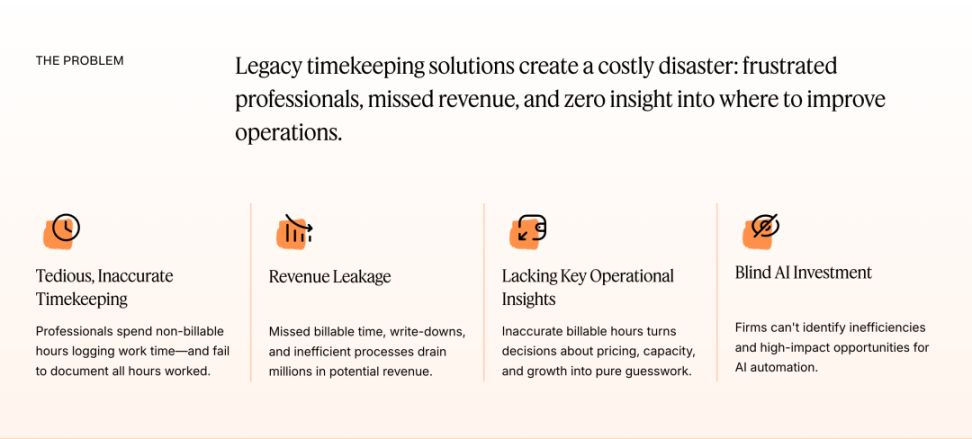
This pain point is far more common than I imagined. According to data from Laurel, professionals can recover an average of over 28 minutes of billable time each day, time that was previously lost due to recording omissions. At an average billing rate of $375 per hour, this means each professional can generate an additional $175 in revenue for the company each day. For large firms with hundreds of professionals, this figure is quite staggering.
Four Key Elements Redefining Time Tracking with AI
Laurel's solution sounds intuitive, but building it is an extremely complex technical challenge. I learned that to truly achieve end-to-end time tracking automation, four key technical issues need to be addressed, each with a considerable technical barrier.
The first challenge is digital footprint tracking. Laurel must be able to integrate with every digital application used by the user, including various work tools like Slack, Microsoft Outlook, and Zoom. Only when AI can "see" all work activities of professionals across platforms can it accurately reconstruct their work trajectories. This is akin to installing a ubiquitous yet completely unobtrusive monitoring system in the user's digital work environment, capable of recording every click, every document edit, and every call.
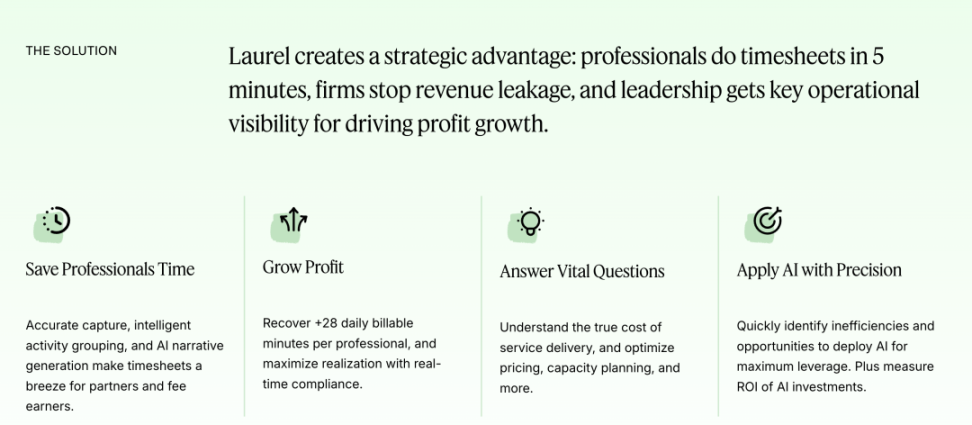
The second layer is the deep integration of AI applications. Laurel employs various AI technologies to process these digital footprints: data clustering algorithms categorize related work, machine learning models assign work to relevant clients and projects, generative AI creates work descriptions, and finally, machine learning encodes and classifies the work. This is not simply applying a ChatGPT interface but building a specialized AI system optimized for professional service workflows.
The third aspect is the delicate balance of human-machine collaboration. The system generates a draft timesheet for users, who can add, delete, or edit content. This "human in the loop" design ensures accuracy while allowing AI to continuously learn and improve. Every interaction from the user makes the system smarter, creating a positive feedback loop.
The fourth step is seamless integration with existing billing systems. Once users confirm the timesheet, the system automatically pushes the data to the firm's billing system, keeping backend management unchanged. This transforms the professional's work experience from "filling out timesheets" to "reviewing timesheets," significantly reducing the psychological burden.
The brilliance of the entire process lies in that it does not force users to change their work habits but works quietly in the background, requiring only final confirmation from the user. This design philosophy reflects profound product thinking: the best technology should be invisible; it should simplify complex tasks rather than add new learning burdens for users.
From Legal Tech Failure to Pioneer in the AI Era
Laurel's success has not been smooth sailing; in fact, it underwent a complete rebirth. The company was initially founded in 2016 under the name "Time by Ping," but struggled in its early years. Alshak candidly acknowledged two main issues: an excessive focus on a single market within the legal industry and the immaturity of natural language processing technology at the time.
The turning point came in 2022 when Alshak gained early access to OpenAI's GPT-3. He made a bold decision: to pause all work and completely restructure the product. This is an extremely rare move in the startup world, where most people would tell you "never rebuild, always iterate." But Alshak chose to go against conventional wisdom, which I believe reflects true entrepreneurial spirit—willing to take significant risks for a greater vision.
When ChatGPT was launched in November 2022, the entire market's perception of AI underwent a dramatic change. Alshak described this shift: "I went from being seen as a madman to businesses actively calling for help." This dramatic transformation created explosive growth for the company, increasing its contract value from zero to $26 million in the past 24 months.
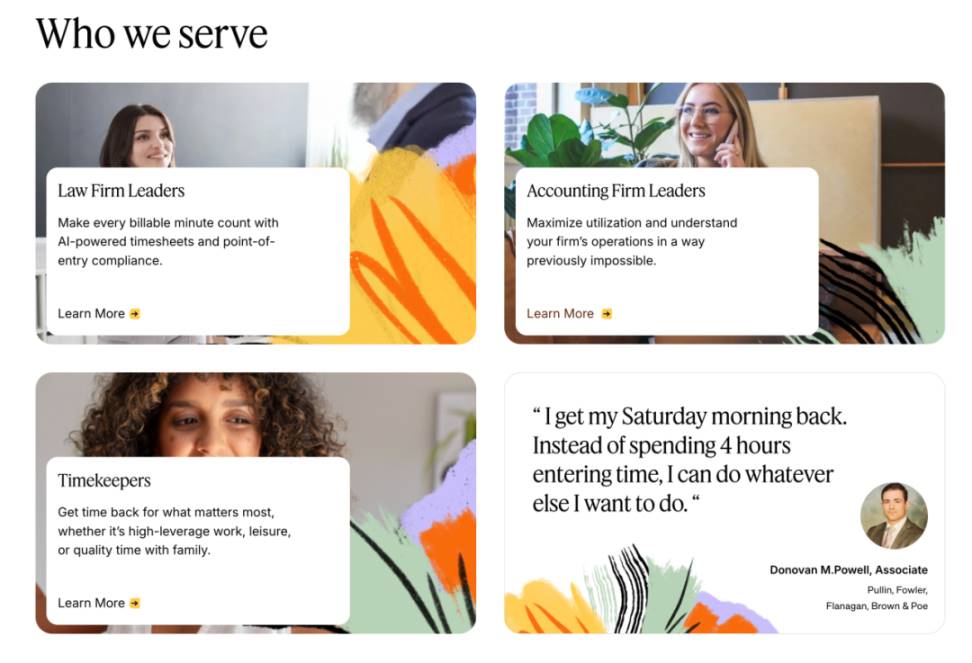
Renaming to Laurel was not just a rebranding; it represented a comprehensive update of the company's culture and core values. The choice of name is also quite meaningful: Alshak wanted to choose a name that feels timeless, not the typical startup name, but one that could be applicable in the 1600s, 2000s, or 4000s. "Laurel" symbolizes achievement in poetry and sports in ancient Greece, and he hopes people feel proud when they see their timesheets, rather than fearful or oppressed.
This story of rebirth deeply resonates with me. It illustrates that in a rapidly changing technological environment, sometimes the bravest choice is not to stick to the established path but to acknowledge mistakes and completely change direction. Laurel's example proves that true innovation often requires this kind of determination and courage to "start over."
Why Now is the Perfect Time for an AI Time Management Explosion
I have been pondering why Laurel has achieved such great success at this moment, and I believe it involves the perfect combination of three key factors: technological maturity, market education, and business urgency.
The breakthroughs on the technology front are foundational. In recent years, the capabilities of large language models have reached a level where they can accurately understand complex work contexts. This is not just about language understanding; more importantly, these models can break down high-level intentions into specific executable steps. When I say, "Prepare a due diligence checklist for the merger project with client ABC," the AI needs to understand which legal areas are involved, what types of documents should be included, how long it will take to complete, and so on. This level of granular understanding was simply not achievable a few years ago.
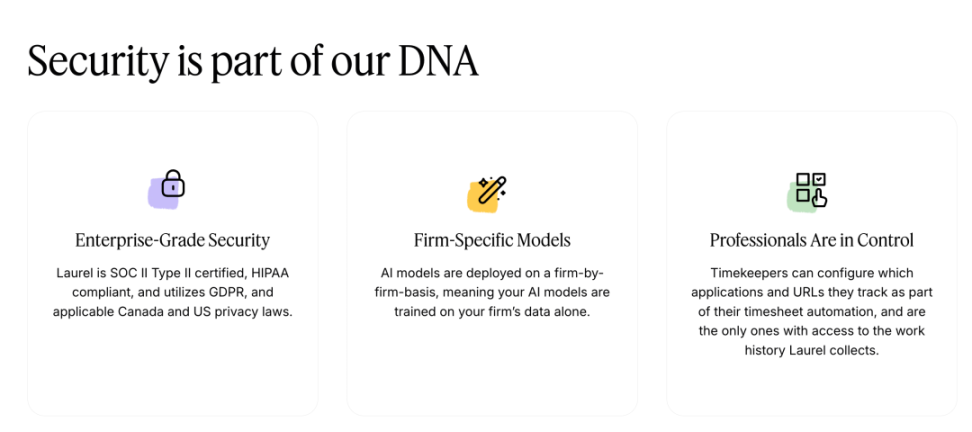
The shift in market education is equally critical. The widespread adoption of ChatGPT has led even the most conservative professional service firms to begin accepting AI technology. I found an interesting phenomenon: in the past, when Alshak pitched AI to law firms in 2018 and 2019, they would say, "We're still not sure if cloud computing is the future, let alone what AI is." But now, the same firms are proactively calling to inquire about how to deploy AI solutions. This shift in market mindset has created an unprecedented opportunity window for companies like Laurel.
The business urgency arises from changes in the economic environment. In a tightening economy, professional service firms face unprecedented pressure for efficiency. Clients are no longer willing to pay for inefficiency, and fixed fee pricing models are becoming more common, requiring firms to have a precise understanding of the true costs of each service. As IVP's Ajay Vashee said, "When you're selling money in a tightening economy, you cut through a lot of noise." Laurel is not selling features; it is selling tangible profit growth, which is persuasive in any economic environment.
There is also a factor that I believe is important but often overlooked: the demand for measuring AI return on investment. Companies plan to invest over $1 trillion in AI over the next five years, but how to measure the effectiveness of these investments remains a black box. Most companies rely on surveys or usage rates as proxy indicators, but these are not accurate enough. Laurel's time data platform can provide quantifiable, verifiable measurements of AI effectiveness, which is extremely valuable for those companies needing to prove the value of AI investments to shareholders.
The convergence of these multiple factors has created the perfect conditions for Laurel's rapid growth. According to the data, their annual recurring revenue has grown by 300% over the past 12 months, usage has increased by 500%, and they are currently collaborating with over 100 top law, accounting, and consulting firms in the United States, the United Kingdom, the European Union, Australia, and Canada. These numbers reflect a collective awakening in an industry under fundamental transformation pressure.
The Deep Value Behind Customer Success Stories
I have always believed that the best product validation comes from real customer feedback, and Laurel has performed impressively in this regard. According to investor IVP, this is the only company they have evaluated that received a perfect customer satisfaction score of 10 from every client. However, I am more interested in the stories behind these numbers.
The feedback from Matt Newnes, partner and head of tax transformation at Ernst & Young, is particularly compelling: "I have personally experienced how Laurel has transformed our approach to time intelligence. The previously manual time recording and entry process has now been significantly technologized. Laurel not only helps our employees comprehensively record their work time but also provides deeper insights into how our teams work, allowing us to identify best practices and ensure we deliver the best results for our clients. This has proven to be one of our most impactful AI investments."
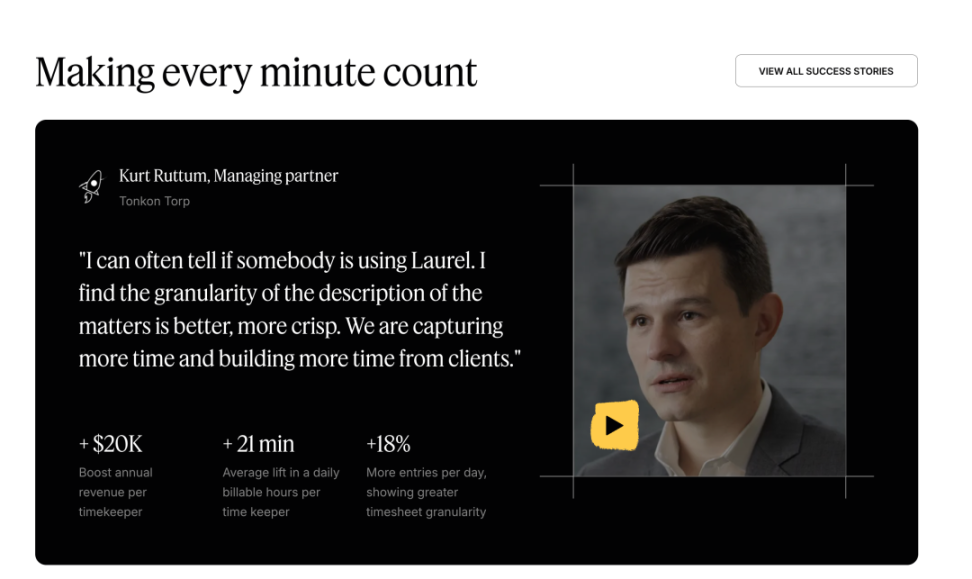
This statement led me to contemplate a deeper issue: the value of time tracking lies not only in billing accuracy but also in insights into work patterns. When businesses can clearly see the differences between efficient and inefficient work, they can standardize best practices and enhance overall team performance. The value of this organizational learning may be more important than direct revenue growth.
The perspective of David Cunningham, Chief Innovation Officer at Reed Smith Global Law Firm, is also enlightening: "As law firms assess the impact of AI and fixed fees, obtaining refined intelligence with less effort is crucial for redefining the value of the firm internally and for its clients." The key term here is "refined intelligence"—not crude time statistics, but deep insights that can guide strategic decision-making.
Tom Barry, managing partner at accounting firm GHJ, left a strong impression with his words: "Do you know how much business insight we can gain from this platform? What we are seeing now is a long-term game: this is not just a tool for tracking time." This shift from a tool mindset to a platform mindset is, I believe, where Laurel's true competitive advantage lies.
From a financial perspective, clients using Laurel report profit increases of 4-11%, primarily due to the additional 28 minutes of billable time per professional each day and an increase in realization rates of 1-4%. These figures have been validated by independent audits from the Big Four accounting firms. More importantly, professionals have saved 80% of the time spent on manual time entry, allowing them to focus on high-value work such as business development, relationship management, and strategic thinking.
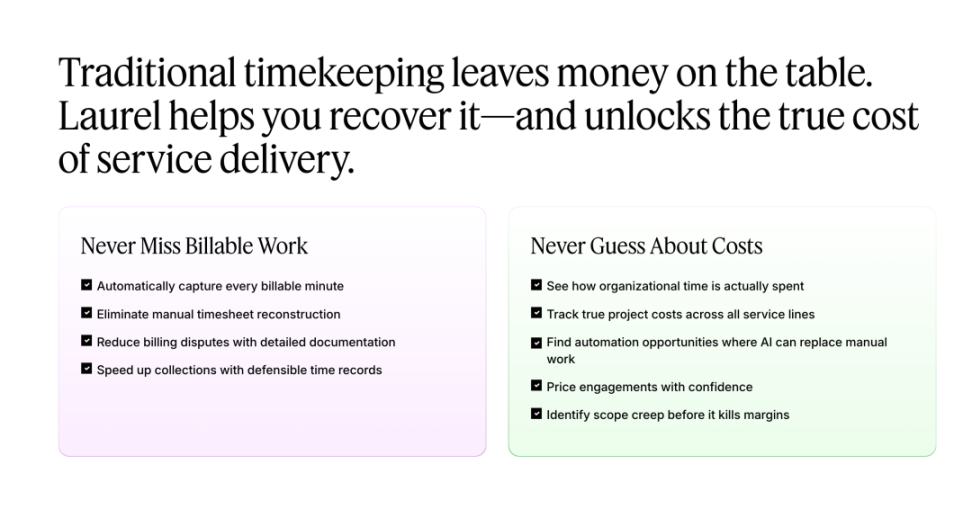
These success stories reveal a larger picture: Laurel is not just solving the time tracking problem; it is redefining the way professional services work. When time becomes visible and optimizable, the efficiency and value creation capabilities of the entire industry will fundamentally improve.
The Three-Phase Vision from Time Tracking to Time Intelligence
In researching Laurel, I discovered that Alshak has a clear three-phase strategic vision, which impressed me with its long-term thinking. This is not a simple product roadmap but a deep reflection on the future of knowledge work as a whole.
The first phase is to prove that machines can record time more effectively and accurately than humans. The key at this stage is to select the right target market—those industries that must record time to make money, such as law, accounting, and consulting. These industries have existing workflows, high execution pressure (not recording time means losing jobs), and a very clear return on investment when automation is achieved. This is why Laurel chose to start with professional services rather than targeting all knowledge workers directly.
The second phase is more ambitious: using machine-generated time data to encourage these industries to stop billing by the hour and start billing by results. Alshak quotes Charlie Munger: "Tell me the incentive and I will tell you the behavior." He believes it is possible to redesign the incentive mechanisms of industries that account for 20% of the U.S. GDP, shifting them from producing activities to producing efficient results. This shift from input-oriented to output-oriented could fundamentally change the business model of the entire professional services industry.
The third phase is the most ambitious: even in a results-based world, people still need to understand time investment to ask themselves, "Am I spending time on things that are leveraged?" The goal of this phase is to extend the value of time data to all business organizations, helping every knowledge worker understand and optimize their time allocation.
The core statistics of this vision are thought-provoking: the average knowledge worker works 9 hours a day, but only 3 hours are spent creating leveraged value. This means that 6 hours are wasted—3 hours on tasks that should be done by AI agents and another 3 hours on tasks that should not be done by humans at all. Calculating this against the global number of knowledge workers, it amounts to 6.4 billion years of time wasted on tasks that humans no longer need to perform. This is Laurel's opportunity space.
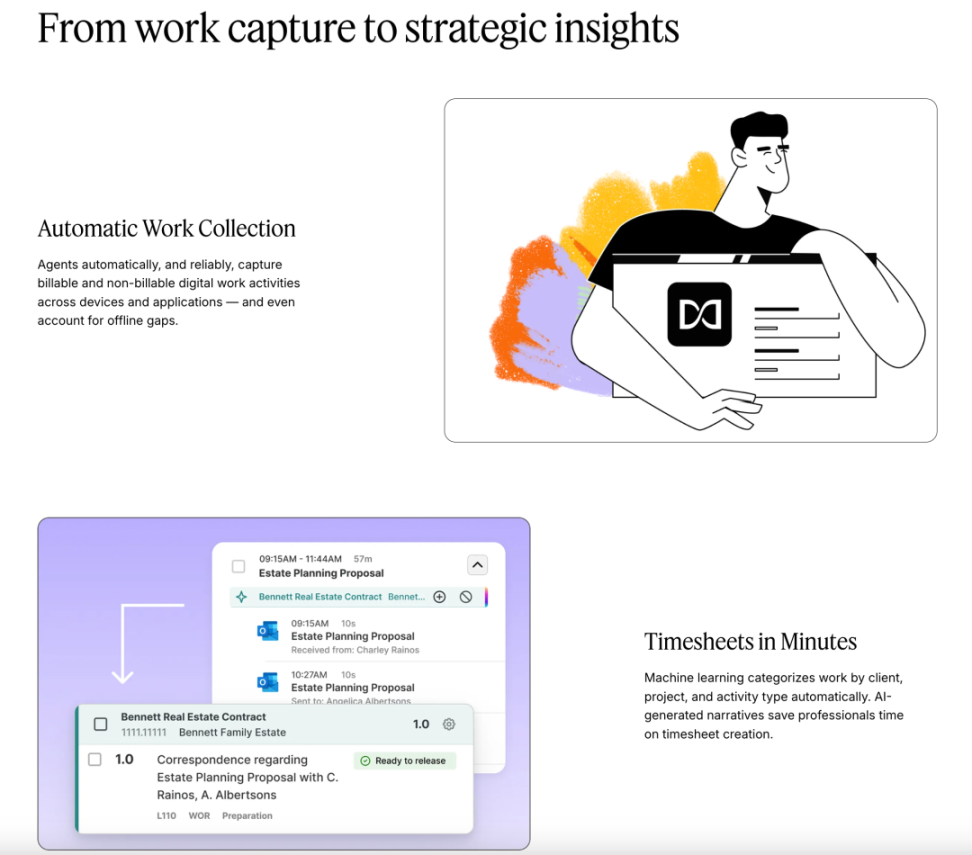
I find this way of thinking very enlightening. Many startups focus on solving existing problems, but Laurel is creating the infrastructure for future possibilities while addressing current issues. Time data is not just for better billing; it is the foundation for understanding and optimizing human work. In the age of AI, this understanding becomes even more critical, as we need to know which tasks should be delegated to machines and which require the unique value of humans.
The Supply Chain Revolution in Professional Services in the AI Era
In delving into Laurel, I discovered a fascinating analogy: they are essentially building "supply chain visibility" for knowledge work. This concept has given me a new perspective on the entire industry.
Alshak made a thought-provoking point: "No one has really mapped time investment to output results. Industries like law and accounting are best at understanding their inputs (time), but they still struggle with pricing value. On the other hand, industries like consulting and financial services understand value but have no idea about the true costs of what they create." This cognitive blind spot has long been resolved in other industries, but in the knowledge work sector, which represents over 50% of global GDP, the supply chain has never been truly revealed.
This analogy reminds me of the transformation journey in manufacturing. Toyota's lean production system revolutionized the manufacturing industry by making the efficiency and waste of each link visible. However, in knowledge work, we are still in a pre-industrial revolution state—large amounts of "inventory" (unfinished tasks), "waiting time" (ineffective meetings and processes), and "defects" (documents needing rework) are hidden in daily work, unquantified and unoptimized.
Laurel's time intelligence platform is essentially creating the first true "supply chain management system" for knowledge work. It not only tracks time but also analyzes workflows, identifies bottlenecks, predicts resource needs, and provides optimization suggestions. This capability becomes especially important in the context of large-scale AI deployment, as businesses need to know the true return on investment of AI tools rather than relying on vague satisfaction surveys.
I believe this shift in supply chain thinking will have profound implications. When professional service firms begin to manage knowledge work like manufacturers manage production lines, they will be able to: accurately predict project costs and timelines, identify which types of work are best suited for automation, optimize team configurations and work assignments, and monitor project health in real-time to make timely adjustments.
This also explains why Laurel can help clients achieve profit growth of 4-11%. This is not just due to more accurate time tracking; more importantly, it is the systemic efficiency gains achieved through supply chain optimization. When you can see the entire "production process" of knowledge work, the opportunities for optimization become clear.
From an investment perspective, the market opportunity of this supply chain revolution is enormous. IVP's Ajay Vashee pointed out: "Professional services represent trillions of dollars in global economic activity, but these companies lack basic visibility into their core resource—time—when operating. By addressing the time intelligence challenge, Laurel has created a platform for broader AI transformation." This is not just a software tool but the infrastructure for the digital transformation of the entire industry.
The Founder’s Philosophy of Time and Mission-Driven Approach
Understanding Alshak's personal story has given me a deeper understanding of Laurel's mission. This is not just a business project; it is a mission-driven enterprise deeply rooted in personal experience.
Alshak often contemplates the topic of death, which may sound heavy, but it is this profound awareness of the finiteness of time that shapes Laurel's core philosophy. The company's AI chat interface is even named "Mori," a tribute to the Latin phrase "memento mori" (remember you must die). This contemplation of death is not negative; rather, it serves as a reminder of the value of cherishing every minute.
What touched me most was the story Alshak shared about his mother. The founding of Laurel is closely tied to the end of his mother's life—she passed away from cancer just weeks after the company secured its seed funding in 2018. Alshak said, "In the final moments of life, a minute spent with her is worth more than a million minutes spent doing anything else. I realized I was not building a time tracking company; I was building a company that helps people understand, 'Am I spending my time in the way I want to?'"
This personal sense of mission has translated into the company's core values. Alshak hopes to be a "mirror" to the world, teaching the world this principle: "We care so much about our money, yet we are so casual about our time. This is a fundamentally inverted framework." He wants to live as if he has 78 years of life, 4,000 weeks of time, making every minute meaningful.
I find that this philosophy of time deeply influences Laurel's product design. The company's Greek wordplay is interesting: Alshak mentions that there are two words for time in Greek—"chronos" (clock time) and "kairos" (perceived time). Laurel is not just tracking chronos; it is helping people optimize kairos—allowing individuals to feel the fullness of time spent on meaningful work rather than the passage of time on ineffective tasks.
This mission-driven approach is also reflected in the company's long-term vision. Alshak hopes that Laurel can eliminate the concept of "9 to 5, Monday to Friday" from the English vocabulary. He believes that the future world will see humans working three to four hours a day while creating two to three times the value they do now. This is not a utopian fantasy but a reasonable expectation based on the development of AI technology.
I believe this sense of mission is Laurel's true competitive advantage. In an increasingly homogeneous tech industry, real differentiation often comes from the deep motivations and values of the founders. When your company is not just about making money but about solving a problem you deeply care about, this passion permeates every aspect of the product, team, and customer experience.
Redefining the Future of Work and Value Creation
In researching Laurel, I continually ponder a larger question: what does this revolution in time intelligence mean for society as a whole? I believe we are on the brink of a fundamental transformation in the way we work.
Historically, every major technological revolution has redefined the nature of work. The Industrial Revolution shifted people from agriculture to manufacturing, and the Information Revolution created the concept of knowledge work. Now, the AI revolution is redefining what constitutes truly valuable human work. The data insights provided by Laurel will help us understand this shift: which tasks should be automated and which require the unique value of humans.
I envision a future work scenario where professionals no longer need to spend time on repetitive tasks, such as drafting standard contracts, organizing financial statements, or preparing routine reports. Instead, they will focus on high-value work that requires creative thinking, emotional intelligence, and strategic judgment. AI will handle information gathering and preliminary analysis, while humans will concentrate on interpretation, decision-making, and relationship building.
This shift will also have profound implications for the business models of the entire professional services industry. Fixed fee pricing will replace hourly billing as the norm, as clients become more concerned with outcomes rather than processes. Laurel's time data will help firms accurately predict the true costs of different types of projects, enabling them to confidently offer fixed-price services.
I also see the societal significance of this transformation. As work becomes more efficient, people will have more time for personal development, family relationships, and community involvement. This is not just an increase in work efficiency but an improvement in quality of life. As Alshak said, the goal is to enable people to create more value in less time and then use the saved time for what truly matters.
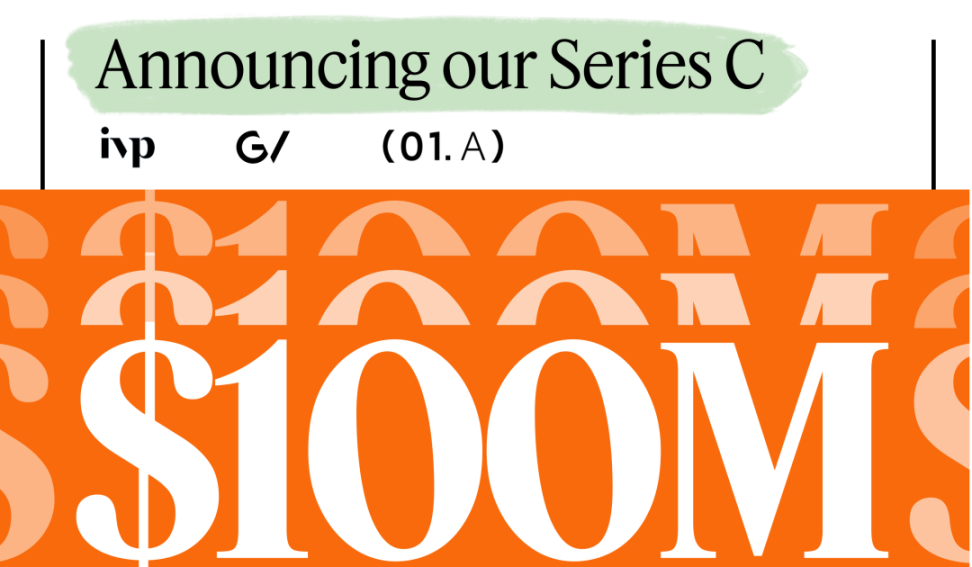
Of course, this transformation will also bring challenges. Some traditional jobs may be automated, requiring the entire industry to rethink talent development and career paths. However, I believe this shift will ultimately create more meaningful and valuable job opportunities. The key is to proactively adapt to this change rather than passively waiting to be disrupted.
From an investment perspective, Laurel represents not just a successful software company but a pioneer in the digital transformation of knowledge work. The time intelligence infrastructure they are building will become essential for business operations in the future AI era. As GV's Frederique Dame stated, "Laurel is creating an enterprise intelligence layer for knowledge work, using time tracking as a wedge for the product. By capturing and organizing the complete lifecycle of how professionals spend their time, Laurel unlocks a new class of data that makes work itself measurable, optimizable, and automatable."
The value of this infrastructure will continue to grow as AI technology advances. As more businesses begin to deploy AI agents and automation tools, Laurel's time data will become the gold standard for measuring the effectiveness of these investments. This is not just a product opportunity but a platform opportunity.
I am excited about Laurel's future, not only because they are addressing a significant market need but also because they are proposing profound reflections on time, work, and the value of life. In this increasingly fast-paced world, companies that help people better understand and utilize time will create social value that transcends financial returns.
Ultimately, Laurel's story tells us that the best entrepreneurial projects often stem from the founders' personal pain points and deep sense of mission. When technological advancement combines with personal passion, it is possible to create companies that truly change the world. In an era where AI is reshaping everything, companies like Laurel, which possess both technological depth and humanistic care, may be the innovative force we need.
免责声明:本文章仅代表作者个人观点,不代表本平台的立场和观点。本文章仅供信息分享,不构成对任何人的任何投资建议。用户与作者之间的任何争议,与本平台无关。如网页中刊载的文章或图片涉及侵权,请提供相关的权利证明和身份证明发送邮件到support@aicoin.com,本平台相关工作人员将会进行核查。




